Liverpool are currently enjoying their best ever start to a Premier League season, with their ten-match unbeaten run positioning The Reds level at the top of the table with last season’s champions, Manchester City. Despite being tied with City on 26 points though, the vast majority of data behind the results suggests that Pep Guardiola’s men are in a league of their own, certainly in the realms of xG. However, there is one analytical metric that rates Liverpool extremely high in terms of performance, even above Guardiola’s record breakers in some cases. Introducing ‘Packing’, a concept created by the revolutionary German organisation, Impect.
What is ‘Packing’?
So, to put it simply, a player is more likely to score if there are fewer opponents between himself and the goal, and ‘Packing’ accumulates the number of opposing players that Team A bypasses during a match, as well as how many bypasses Team A suffers. Logically, any attacking team has to progress beyond the defending team to some extent in order to score a goal, thus, the aim throughout the large majority of football matches is to outplay the opposing team. Any opposing player that is outplayed by being dribbled past, crossed beyond or passed beyond is recorded as ‘Packed’, as they’re no longer able to prevent the ongoing attack.
Such data can provide an insight into how progressive a team is with possession, how defensively organised they are, how well they manage transitions, and what players contribute, as well as various other aspects which I’ll explore further into the article, with a focus on Liverpool.
Before we look at the data, I’ve produced a quick video to act as an example of how Packing works during a match.
Analysing Progression
Now that I’ve hopefully explained the concept of Packing clearly enough, we can focus on the data at hand. I’ve split the data into two parts as I personally found it easier to understand that way, with the first focus being progression, and the second being penetration.
So, on average so far this season, Liverpool outplay 357 opponents per match through passing, dribbling and crossing, which is bettered only by Man City with 414, and Chelsea with an impressive 448. Liverpool are marginally ahead of Arsenal, Spurs and Man Utd, who averages 331, 327 and 317 respectively. In this regard, Liverpool are performing well and are able to play through opposing teams relatively easily, but are somewhat lagging behind arguably their two biggest title rivals in terms of creativity in possession, as shown in the table below.
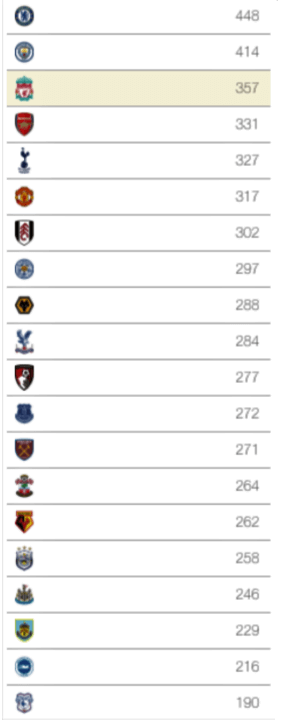
It’s unsurprising that Chelsea are leading the way in terms of progressing the ball beyond opponents, given Maurizio Sarri’s belief in vertical passing. Chelsea’s players are encouraged to play the ball forward rather than sideways, so the likes of Luiz, Rudiger, Jorginho and Kovacic will consistently play splitting passes to teammates situated between the lines in more advanced positions, thus bypassing opponents in the process and adding to their Packing score, as demonstrated in the clip below.
In addition to bypassing opponents through passing through, opposing players can also be outplayed through pressing. For example, if Liverpool press and win the ball from the opposing team’s deepest defender, his nine more advanced teammates are then left behind the ball, unable to stop Liverpool’s immediate attack and are thus recorded as Packed. So, in terms of pressing, Liverpool outplay 174 opponents per match, the league’s fourth-best score. In this category and as shown in the table below, Man City and Chelsea are ranked as 15th and 17th in the league with averages of 149 and 147, with Man Utd even lower averaging 143.
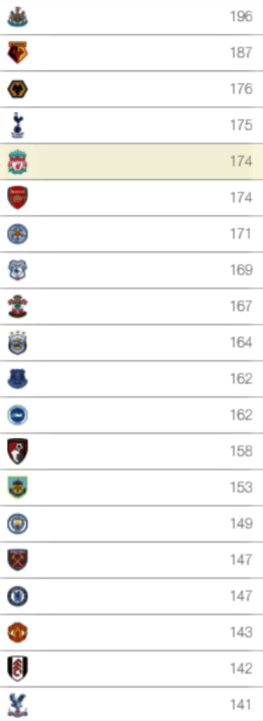
What does this indicate? Well, it shows us that Liverpool are strong in both categories when it comes to bypassing opponents, whereas Man City and Chelsea are only strong with the ball. Liverpool are consistently able to create openings through creativity with possession, as well as through pressing moments. That in comparison to City and Chelsea, who are more progressive than Liverpool when in possession, but whenever they regain the ball through pressing, the immediate moment is less threatening.
This is perhaps due to the fact that Jurgen Klopp has always viewed pressing as a means of chance creation, whereas Guardiola and Sarri are more inclined to perceive it as a method to regain the ball to then recirculate, due to their possession-based philosophies. Also, the playing styles of Man City and Chelsea regularly result in the opposition being unable to escape from defending their own box, so whenever Chelsea or City regain the ball through pressing, the opposing team are usually already positioned deeply with men behind the ball, so the pressing regain is unlikely to bypass many opponents.
That in comparison to Liverpool, who are marginally less likely to have the opposing team penned in, as Klopp’s men often retreat to allow them to play into traps, resulting in more opposing players being bypassed whenever the ball is regained by The Reds through pressing. Liverpool often adopt such an approach with a lead, by forcing the opposing team to overcommit and expand their shape to chase the game, allowing Liverpool to counter immediately once regaining the ball.
Analysing Penetration
Now, in addition to recording outplayed opponents, Impect also record which of those opponents are ‘defenders’, as outplaying an opposing team’s defender is much more likely to result in a goal than outplaying their striker, for example. ‘Defenders’ are characterised by Impect as the last 6 players defending the goal, so for example, those players in most cases would *likely* be the opposing team’s GK, LB, RB, CB, CB and DM. Impect perceives these defenders as more valuable, as if they’re outplayed then the likelihood is that a scoring opportunity will follow. Below, I’ve expanded on the clip used earlier as an example to highlight which players are recorded as ‘defenders’.
To provide a further example, on the opening day of the season Liverpool beat West Ham 4-0 at Anfield, and if we focus on the outplayed defenders, it’s clear to see why the result was so one-sided. Offensively, Liverpool outplayed 70 opposing defenders in the match, but suffered just 21 themselves, as shown in the table below. This indicates that Liverpool penetrated West Ham’s backline with ease, whereas West Ham found it extremely difficult to play through Liverpool’s defence.
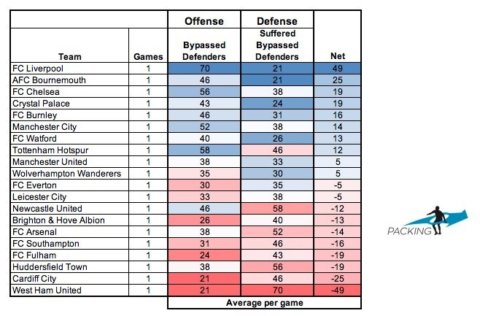
So after the opening match, Liverpool had bypassed 70 defenders, and suffered 21, leaving a net score of +49. To provide context, Man City played a tougher side in Arsenal and outplayed 52 defenders, with 38 suffered, resulting in a much more even match and a net score of +14 for Guardiola’s men.
In terms of outplaying defenders over the season, Liverpool so far averages 54 per match which is the league’s second-best behind only Chelsea with 56. Man City average 52 per match, with Arsenal accumulating 50, and Spurs then follow with 47. Man Utd are positioned 8th in the league with 41 per match, below both Bournemouth and Wolves, as shown in the graphic below.
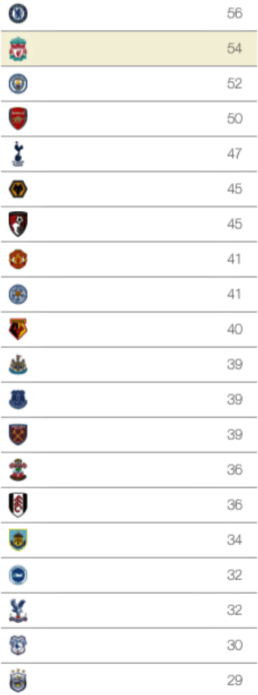
It’s perhaps no surprise that Chelsea have the leading average considering they have two players ranked in the top five for outplaying defenders in Hazard and Jorginho, who each average 10 per match, with Hazard’s likely coming through dribbling, and Jorginho’s through passing. The player with the highest average in the league when it comes to bypassing defenders? Former Red, Jonjo Shelvey, with 12 defenders bypassed per match, indicating that he may have been the answer to Southgate’s issue in the summer in relation to quickly feeding attackers in the final third.
Defensively, regarding outplayed defenders suffered, Liverpool are positioned 3rd with an average of 31.5 per match. Impressively, the league’s best are Wolves, with an average of 30 suffered, followed by Man City with 30.2. Chelsea are poor in this regard, with an average of 40.2, which is worse than Palace, Brighton, Watford, Everton, Spurs and Bournemouth. This signals that although Chelsea can compete in terms of creation, progression and penetration, they are significantly adrift defensively perhaps due to the lack of understanding and cohesion when the ball is lost, as Sarri has only been in charge for a number of months. Liverpool, City and Wolves are all expertly drilled without the ball, and maintain a compactness so that opposing teams struggle to penetrate them in the areas that matter.
When focusing on the overall package regarding outplaying defenders, Liverpool are currently ranked as the league’s best, as an offensive average of 54 combined with a defensive average of 31.5 leaves a net of +23. City then follow with +22, and a large gap then emerges with Chelsea and Wolves both on +16. Arsenal then follow with +12, but their problem is similar to Chelsea’s in that they can compete when given possession, but they’re extremely open once the ball is lost. Liverpool are currently ranked as the most balanced side in the league in terms of outplaying defenders whilst nullifying the opposition at the same time, albeit followed closely by the holder’s Man City, indicating that this season’s title chase is very much a two-horse race, epitomised in the table below.
I should note that although all the data stated thus far is up-to-date, the table below was made BEFORE the match against Cardiff, but it’s still largely accurate.
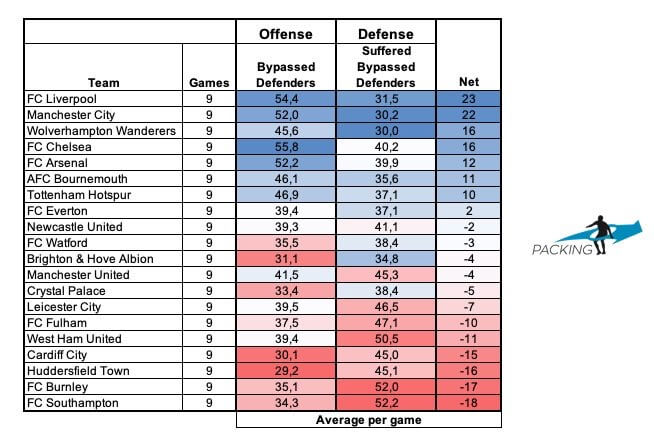
Analysing The Players
When analysing the data, several players stood out in terms of their performance, so I’ll individually address each case that I found interesting.
Firstly, we have to start with James Milner, who according to the data is the best in the league relative to his position. Milner bypasses 50 opponents per match based on the figures so far this season, which is likely done through passing or pressing regains because he’s certainly not the type to make advances through dribbling, and his crossing game is less prominent since moving away from the left-back position.
Milner’s average is better than 93% of players in his position, and 8.6 of those 50 opponents bypassed per match are defenders, which is better than 91% of the league. So, this shows that in addition to progressing the ball when building deeper, Milner is also equally as productive when it comes to penetrative passes in decisive areas.
Defensively Milner is outstanding, as he prevents opposing players bypassing him on average 12.1 times per match, the best figure for all midfielders in the league. By combining his progressive play with his proactive defending, Milner is currently ranked as the #1 midfielder in the Premier League in reference to Packing, further emphasising his strong start to the campaign.
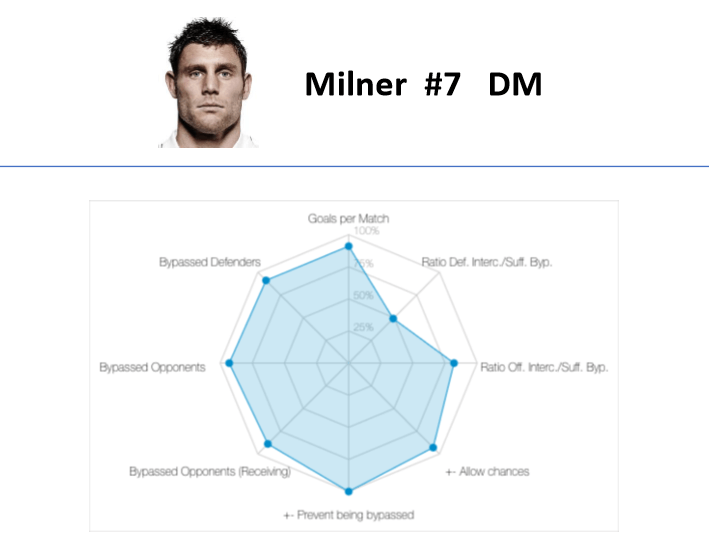
Next, we have to focus on Gini Wijnaldum, and this may surprise a few. Offensively, Wijnaldum bypasses just 18 opponents per match which is considerably regressive in comparison to Milner’s average of 50. That average of just 18 means that Wijnaldum is better than just 9% of the league’s midfielders when it comes to outplaying opponents. The figures are even worse when specifying which of those opponents are defenders, as he averages just 2.3 per match which is better than just 4% (!!!) of the midfielders in the league.
Although these figures may be surprising to many, I personally expected this as I wrote an observation on his overall game last season, in which I deemed his contribution to build-up play somewhat odd. That piece can be read here, but I recall stating in the article that after 76 Premier League appearances for Newcastle and Liverpool, Wijnaldum had somehow completed a total of just six through-balls.
However, Wijnaldum does redeem himself significantly when it comes to defending, as he prevents 10 opponents per match from progressing beyond him, which betters 91% of the league’s midfielders. Overall, Wijnaldum is definitely an asset, and he’s become significantly more involved in build-up since I wrote that piece on him last year, completing 111 passes against Cardiff recently, but his ball progression in terms of advancing up the field can definitely improve.
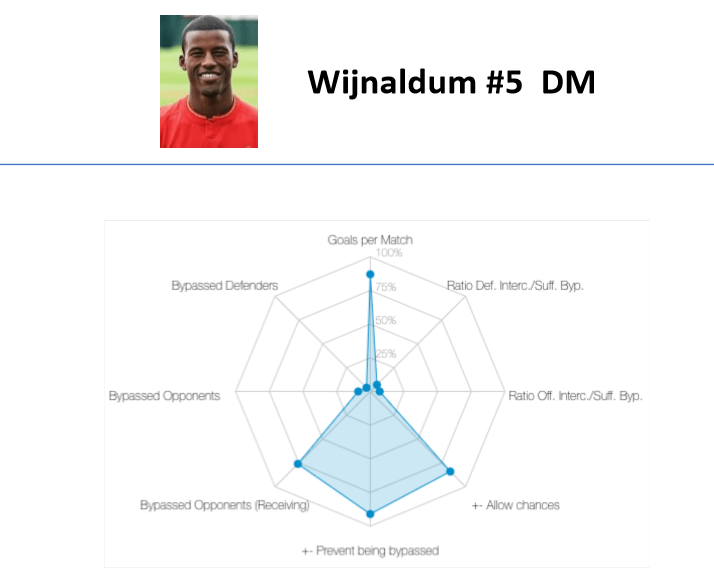
Jordan Henderson is the next focus, as, despite the perception of his backwards passing style, he scores fairly well. Henderson bypasses 38 opponents per match which is a higher average than 76% of the league’s midfielders, and considerably better than Wijnaldum’s score. Also, 6.3 of those 38 are defenders, indicating that his penetrative passing is better than 82% of players in his position according to the data so far this season. He’s not the most progressive player by any means, but he’s certainly not regressive, especially in comparison to Wijnaldum.
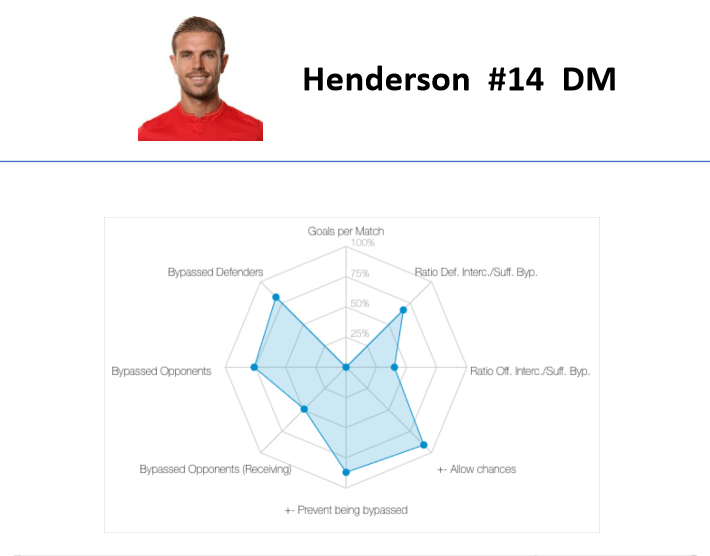
Andy Robertson is another standout performer when focusing on numbers, as he’s better than the large majority of the league’s left-backs both offensively and defensively. For both bypassing opponents and defenders, Robertson is better than 94% of his rival competitors in the Premier League. He bypasses 57 opponents per match, of which 7.9 are defenders, which is productive considering Robertson is a defensive player himself, so he technically shouldn’t be in and around opposing defenders. Defensively, he’s again better than 94% of other left-backs, with an average of 9.6 opponents prevented from progressing beyond him per match.
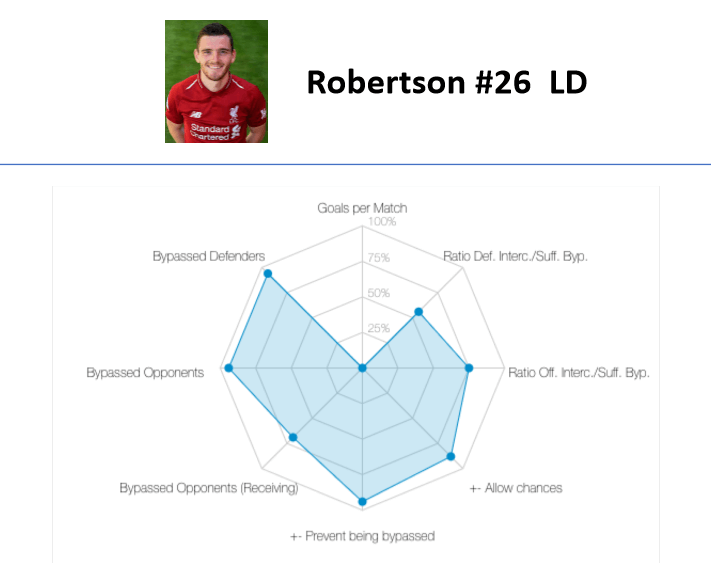
Finally, Liverpool’s link player, Roberto Firmino. The Brazilian’s constant roaming from his central position allows him to create, and with Salah and Mane constantly running in behind, Firmino is able to find players in spaces due to the stretched defences ahead of him. On average, Firmino bypasses 11 opponents per match, and crucially, 5.2 of those are defenders. These numbers mean that Firmino beats 96% of rival strikers in the league when it comes to Packing, epitomising how different Liverpool’s #9 is to the traditional mould, as he’s as much of a creator as he is a scorer.
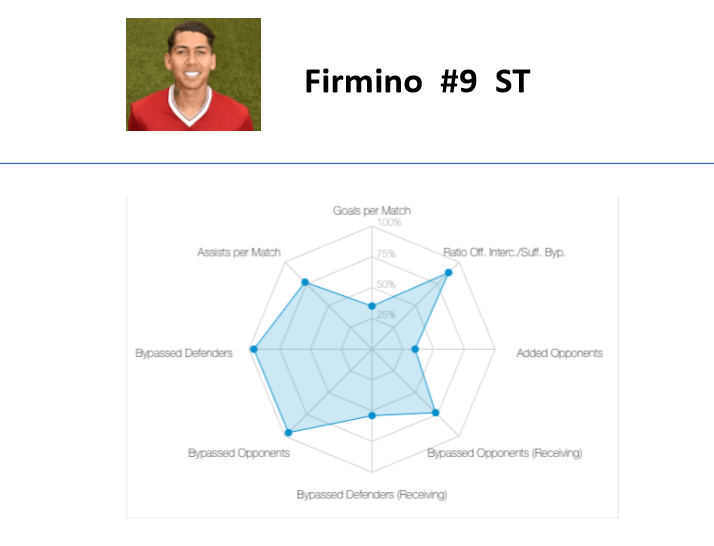
Conclusion
Overall, Liverpool’s performance in reference to Packing is very encouraging, and the data collected by Impect so far this campaign indicates that there are two sides currently performing at a level above the rest. Jurgen Klopp has formulated a team that is incredibly well balanced both offensively and defensively, which hasn’t been the case at Liverpool for around a decade. His side are able to create opportunities through different means, and they’re presently the strongest in the division when it comes to the decisive areas of the pitch.
In terms of players, we’ve learnt that Milner is good to say the least, Wijnaldum is the predominantly safe player in possession, not Henderson, and Andy Robertson is certainly one of the best and most complete left-backs in the country.
So, given that the fundamental objective throughout the large majority of football matches is to outplay the opposition whilst restricting their efforts, Liverpool should be in for a very competitive season, because they’re better at it than most.




Very great analysis. I love it.
Excellent analytical piece, one of the best I have ever read. Thanks!
A more essential and sensible metric than XG statistics.